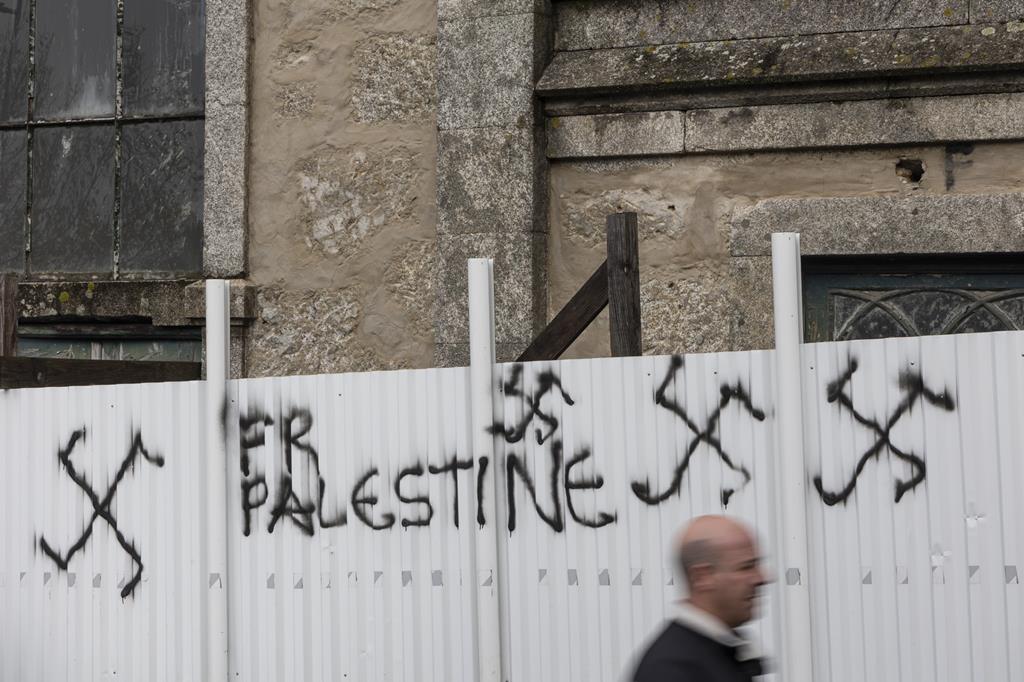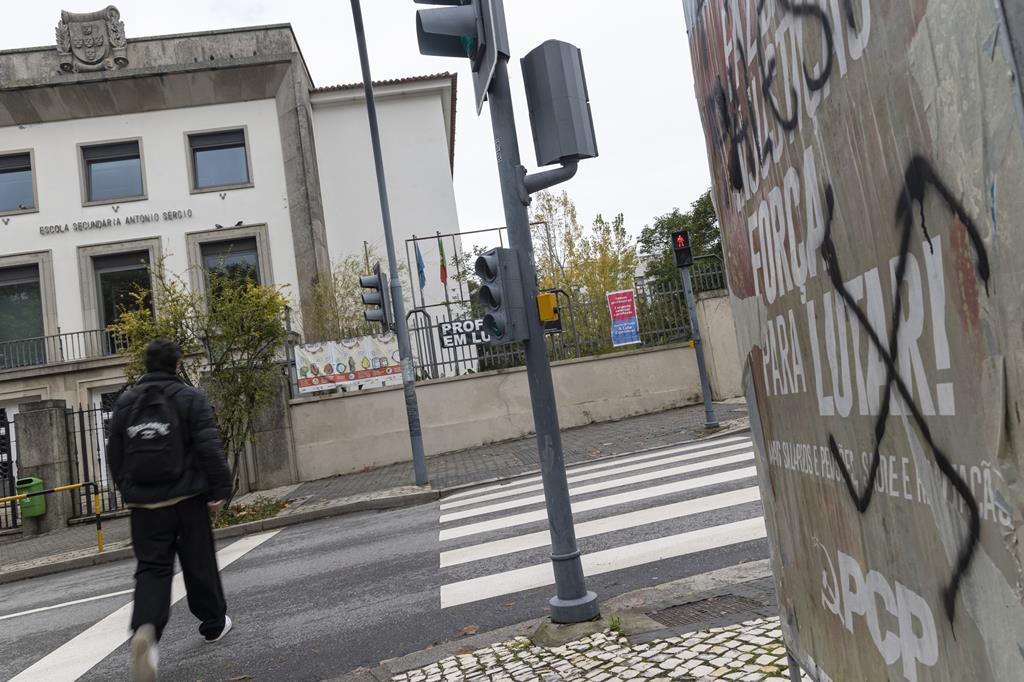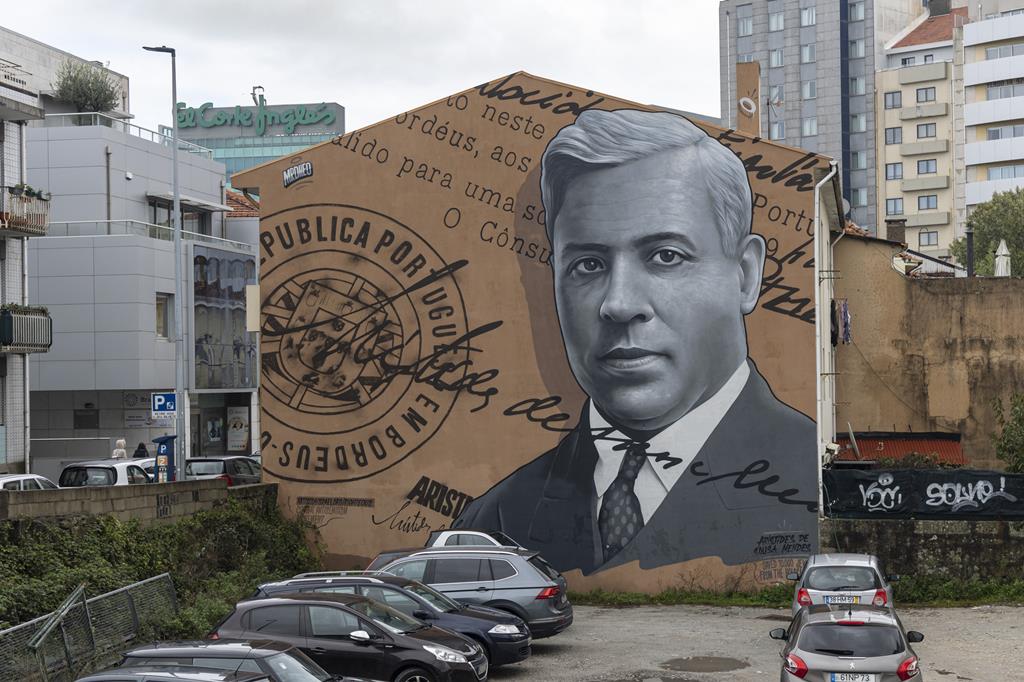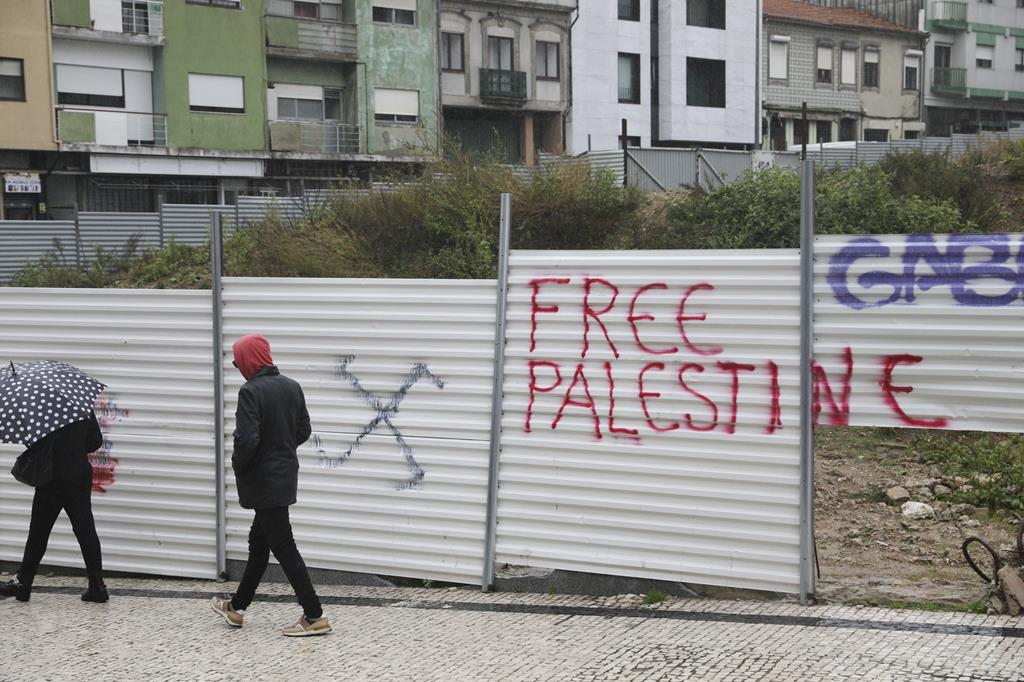The graffiti was painted in several locations in the center of Vila Nova de Gaia. Photo: Miguel Marques Ribeiro/ RR
Paintings of swastikas and Israel's supposed apartheid bring together right-wing and left-wing political extremism. These are anti-Jewish and anti-Israel behaviors that fit the universally recognized definitions of anti-Semitism.
Dozens of swastika crosses appeared painted in the center of Vila Nova de Gaia. It was not possible to determine on what day they were made, but their presence began to be noticed last week, with particular incidence in the area of the General Torres metro station and in cross streets. The symbol, of an anti-Semitic nature, was also painted near the entrance to the António Sérgio Secondary School.
Next to the swastika crosses could be read the phrase, repeated several times, “Free Palestine”, a slogan associated with the pro-Palestine movements, whose voice was heard again with force after the rekindling of the Israel-Hamas conflict, on the 7th of October.
The crosses made around General Torres were meanwhile removed, albeit imperfectly, as, despite the cleaning carried out, some were still visible on Monday. Vila Nova de Gaia City Council declined to comment on the matter.
"I don't want to believe it's a joke and, above all, I think the authorities shouldn't treat this as if it were a joke", says André Inácio, from the Observatory of Security, Organized Crime and Terrorism (OSCOT).
The researcher highlights the "very strong impact" that the swastika has on creating a "feeling of insecurity in society", especially after the start of the war in the Middle East.
Contacted by Renascença, the Movement for the Rights of the Palestinian People (MPPM) distanced itself from the paintings, denying any responsibility. “We reject and condemn all these types of gestures in the most vehement way and without any hesitation”, stated Carlos Almeida.
For the leader of the movement, defending the rights of the Palestinian people “is not a religious issue, it is a political issue”, especially since “the Palestinian population is Jewish, Muslim and Christian”.

The pro-Palestinian movement declines any responsibility for the creation of the paintings. Photo: Miguel Marques Ribeiro/ RR
In turn, a representative of Porto's Jewish community, Gabriela Cantergi, considers that this type of “anti-Semitic manifestations” must be looked at “very carefully”.
“There is an alert regarding the security of the Jewish community in Porto and Jewish communities in general”, she highlights.
Cantergi laments that “there is great confusion between what it means to be a Jew, what it means to be an Israeli and what it means to agree with the government” of Prime Minister Benjamin Netanyahu, but explains that there is latent anti-Semitism in Europe.
“It is enough for there to be some fact in the Middle East for this anti-Semitism, which is either dormant or a little silent between generations, to emerge with force.”
“Either action is taken or these things will be all over Europe”
OSCOT sees signs that the “sense of intolerance is growing” and shows “concern” about the appearance of this type of phenomenon in Portugal.
“Every time we have a demonstration in favor of Palestine or in favor of Israel, we are arousing hatred on the part of the opposite party" and "contributing to radicalization", argues security expert, André Inácio.
Several factors, such as the intensive use of social networks, the deterioration of the mental health of young people and, in particular, of university students, facilitate the work of organized groups on both sides, whose objective is not to contribute to a solution, but to feed the hatred and intolerance.
“Anything that involves street demonstrations are only instruments to foment and encourage hatred and a whole situation of discontent and instability in the community”, he concludes.

The Jewish community in Porto claims that there is dormant anti-Semitism in Europe. Photo: Miguel Marques Ribeiro/ RR
In Portugal, the phenomenon of intolerance is not as intense, guarantees André Inácio, “but in France, Germany, the United Kingdom, we have clear signs. Mosques are being attacked. Synagogues are being attacked. They are marking people's houses and this is a phenomenon that spreads, this is an uncontrolled fire. Therefore, either action is taken or these things will be all over Europe.”
In our country, recalls the university professor, advocating Nazism is not a crime, unlike what happens in Germany and Austria. More recently, Brazil also approved legislation in this regard.
Even so, the graffiti of the swastika cross can be classified, in legal terms, as “a crime of incitement to hatred” provided for in article 240 of the Penal Code, says the expert. The penalty for this offense ranges from six months to five years.
“It is necessary that each of these signs that arise are investigated, that their authors are identified and that they have consequences. We have to act with proportionality and adequacy, but we have to act. We cannot wait for it to pass, because this will only grow,” he declared.
In this sense, authorities must act diligently. Gabriela Cantergi, from the Porto Jewish community, guarantees that “the responsible institutions are paying attention”.
On October 11, when the entrance to the Porto synagogue was vandalized, the police opened an investigation to determine the facts. Regarding this, however, the interviewed admits that she has “no information”.

The Security Observatory considers that it is necessary to combat the phenomenon of intolerance. Photo: Miguel Marques Ribeiro/ RR
Regarding the most recent case, in Vila de Nova de Gaia, a local PSP source told Renascença that they had not received any complaints, without providing further information.
A few meters from the places where the paintings were made, there is a mural paying homage to Aristides de Sousa Mendes.
Whether or not the authors of the graffiti with swastika crosses know the story of the Portuguese consul is not possible to know.
Aristides saved thousands of Jews from Nazi persecution and is considered one of the "Righteous Among the Nations" by the World Holocaust Remembrance Center, Yad Vashem.
Source: Radio Renascença


































